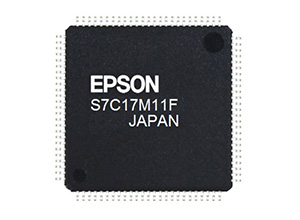Seiko Epson Corporation (TSE: 6724, “Epson”) has begun shipping samples of the S7C17M11, a low-power 16-bit microcontroller with on-chip Flash memory, a crystal unit, and a highly accurate real-time clock (RTC) with a temperature compensation function. Epson plans to produce an initial 300,000 units per month when volume production beings in January 2017.
Precise timekeeping is important for many microcontroller equipped devices such as electricity meters. Accurate meters are essential, for example, in the many countries and regions where power companies charge different rates depending on the time of day. Epson, which boasts both a semiconductor and a quartz crystal device business, has leveraged its strengths to integrate a crystal unit into the S7C17M11 microcontroller package that allows customers to develop accurate timekeeping efficiently even under harsh environmental conditions, such as in outdoor meters.
An ordinary RTC consists of a timekeeping IC that is connected to an external crystal unit. Time is measured based on the frequency of the crystal unit. However, the stability of the crystal unit’s oscillation frequency varies by product. Frequency stability, and thus accuracy, is also affected by the temperature of the environment in which it is used. For this reason, when a microcontroller is used in a harsh environment with extreme temperatures or extreme temperature fluctuations, users had to take into account deviations in oscillation frequency caused by temperature changes when they designed their end-products, and sometimes they were unable to achieve the desired timekeeping accuracy.
To address this situation, Epson integrated one of its own high-stability crystal units into the S7C17M11 microcontroller package and developed technology for detecting and correcting frequency deviations caused by temperature changes. The S7C17M11 is accurate to within 10 seconds per month at temperatures between 0℃ and 50℃, 13.2 seconds per month between -30℃ and 70℃, and 26.4 seconds per month between -40℃ and 85℃. Moreover, this integrated, single-chip solution eliminates the need for adjustments, thus reducing customers’ development time and reducing the number of discrete components.
The S7C17M11 has a number of other integrated peripheral circuits, including but not limited to Flash memory, a 12-bit AD converter*1, and an LCD driver with a built-in liquid crystal power supply for a 240-segment display. Power consumption in RTC mode is 2.25 µA (typical).
*1 A circuit that converts analog signals to digital signals



















